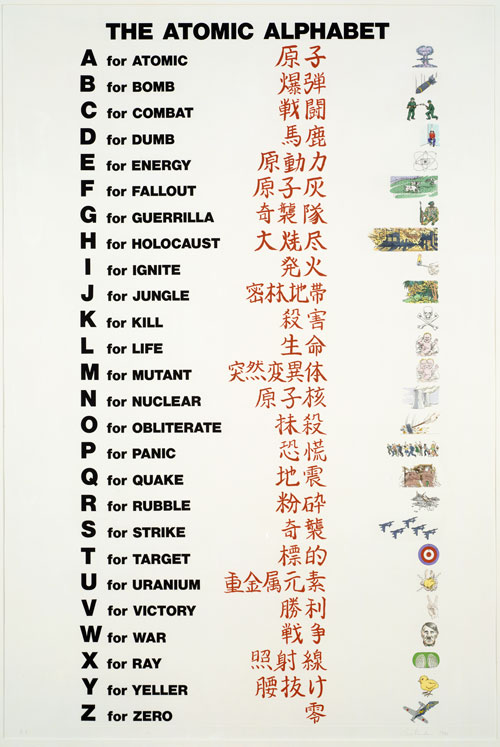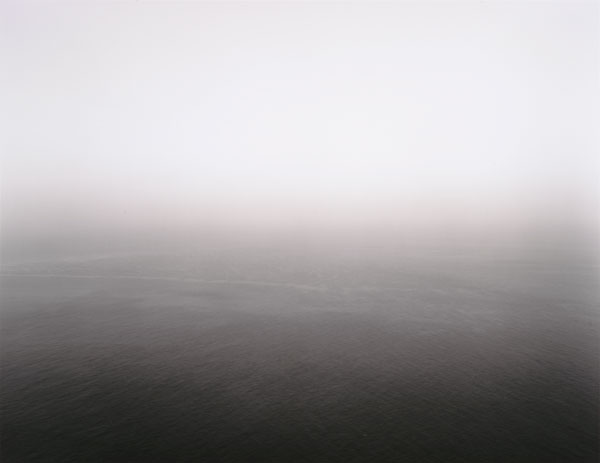Collection Rotation: Allyssa Wolf
At last, the return of Collection Rotation. In this monthly feature, I invite someone to organize a mini-exhibition from our collection works online. Please welcome today’s guest, the poet Allyssa Wolf.Unless otherwise noted, text excerpts below are from Guy Debord’s Critique of Separation. Audio files courtesy the good folks at PennSound. Take your time with this one; it will reward you for it.
Critique of Separation
“We don’t know what to say. Sequences of words are repeated; gestures are recognized. Outside us. Of course some methods are mastered, some results are verified. Often it’s amusing. But so many things we wanted have not been attained, or only partially and not like we imagined. What communication have we desired, or experienced, or only simulated? What real project has been lost?”
—
“separation of character and night/no language” “they’ve destroyed language/ so we have to destroy it in it”
Leslie Scalapino, ‘Can’t’ is ‘Night’
—
—
“After all the empty time, all the lost moments, there remain these endlessly traversed postcard landscapes; this distance organized between each and everyone. Childhood? Why, it’s right here — we have never emerged from it.
Our era accumulates powers and imagines itself as rational. But no one recognizes these powers as their own. Nowhere is there any entry to adulthood. The only thing that happens is that this long restlessness sometimes eventually evolves into a routinized sleep. Because no one ceases to be kept under guardianship. The point is not to recognize that some people live more or less poorly than others, but that we all live in ways that are out of our control.
At the same time, it is a world that has taught us how things change. Nothing stays the same. The world changes more rapidly every day; and I have no doubt that those who day after day produce it against themselves can appropriate it for themselves.”
—

John Gutmann, Promenade Deck, M.S. Brimanger, Pacific Ocean, 1933 © 1998 Center for Creative Photography, Arizona Board of Regents
—

John Gutmann, Stalin and Chiang Kai-shek Painted and Displayed by Kumming Artist, China, 1944, printed ca. 1990 © 1998 Center for Creative Photography, Arizona Board of Regents
—
“creatures spend a lot of great time not moving, flowers don’t move” “I’ve spent most of the time staring and not moving”
—
“The only adventure, we said, is to contest the totality, whose center is this way of living, where we can test our strength but never use it. No adventure is directly created for us. The adventures that are presented to us form part of the mass of legends transmitted by the cinema or in other ways; part of the whole spectacular sham of history.
Until the environment is collectively dominated, there will be no real individuals — only specters haunting the objects anarchically presented to them by others. In chance situations we meet separated people moving randomly. Their divergent emotions neutralize each other and reinforce their solid environment of boredom. As long as we are unable to make our own history, to freely create situations, our striving toward unity will give rise to other separations. The quest for a unified activity leads to the formation of new specializations.
And only a few encounters were like signals emanating from a more intense life, a life that has not really been found.”
—

Katharina Sieverding, Transformer, 1973/1974 © Artists Rights Society (ARS), New York / VG Bild-Kunst Bonn, Germany
“In all this there lay. No description. And so.
Whether. They could come to be nearly. More.
Than more. Or rather. Did she. Bow to her brother.”
Gertrude Stein, How She Bowed to Her Brother
“this isn’t sometimes, this is always”
John Wieners, Wracked by Beauty…
—
“This general critique of separation obviously contains, and conceals, some particular memories. A less recognized pain, a less explicable feeling of shame. Just what separation was it? How quickly we have lived! It is to this point in our haphazard story that we now return
Everything involving the sphere of loss — that is, what I have lost of myself, the time that has gone; and disappearance, flight; and the general evanescence of things, and even what in the prevalent and therefore most vulgar social sense of time is called wasted time — all this finds in that strangely apt old military term, lost children, its intersection with the sphere of discovery, of the exploration of unknown terrains, and with all the forms of quest, adventure, avant-garde.”
—

Annette Messager, Histoire des Robes (The History of Dresses), 1990 © Artists Rights Society (ARS), New York / ADAGP, Paris
“The world’s furious song flows through my costume”
—
“The spectacle as a whole is nothing other than this era, an era in which a certain youth has recognized itself. It is the gap between that image and its consequences; the gap between the visions, tastes, refusals and projects that previously characterized this youth and the way it has advanced into ordinary life.
We have invented nothing. We adapt ourselves, with a few variations, into the network of possible itineraries. We get used to it, it seems.
No one returns from an enterprise with the ardor they had upon setting out. Fair companions, adventure is dead.
Who will resist? It is necessary to go beyond this partial defeat. Of course. And how to do it?
This is a film that interrupts itself and does not come to an end.
All conclusions remain to be drawn; everything has to be recalculated.
The problem continues to be posed — in continually more complicated terms. We have to resort to other measures.
Just as there was no profound reason to begin this formless message, so there is none for concluding it.
I have scarcely begun to make you understand that I don’t intend to play the game.”
Allyssa Wolf is a poet who lives in Chicago and Los Angeles. Her books are Vaudeville (Seismicity Editions/Otis Books, 2006), Sister (Cannibal Books, 2010), and Loquela (Insert Press, 2010). She is the recipient of a Gertrude Stein Award for Innovative Writing, and her work was featured in the 2001 Venice Biennale.



Comments (1)
I completely agree with the above comment, the internet is with a doubt growing into the most important medium of communication across the globe and its due to sites like this that ideas are spreading so quickly.